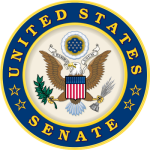- 産業: Government
- Number of terms: 4127
- Number of blossaries: 0
- Company Profile:
The United States Senate is the upper house of the United States Congress. The composition and powers of the Senate are established in Article One of the U.S. Constitution. Each U.S. state is represented by two senators, regardless of population. Senators serve staggered six-year terms.
A proposed law passed by Congress must be presented to the President, who then has 10 days to approve or disapprove it. The President signs bills he supports, making them law. He vetoes a bill by returning it to the house in which it began, usually with a written message. Normally, bills he neither signs nor vetoes within 10 days become law without his signature.
Industry:Government
An appointment by the President to executive or judicial office that is subject to Senate confirmation.
Industry:Government
Once legislation has passed both chambers of Congress in identical form, been signed into law by the President, become law without his signature, or passed over his veto, the legislation is enacted.
Industry:Government
When the Chair rules on a point of order, any Senator may appeal the ruling, in which case the full Senate makes a final decision on the point of order by voting whether to sustain or reverse the ruling.
Industry:Government
Unless rules specify otherwise, the Senate may agree to any question by a majority of Senators voting, if a quorum is present. The Chair puts each question by voice vote unless the "yeas and nays" are requested, in which case a roll call vote occurs.
Industry:Government
Informal term for the Senate giving "Advice and Consent" to a presidential nomination for an executive or judicial position.
Industry:Government
Legislation (a bill or joint resolution) which has passed both chambers of Congress in identical form, been signed into law by the President, or passed over his veto, thus becoming law. Technically, this term also refers to a bill that has been passed by one house and engrossed (prepared as an official copy).
Industry:Government
The Majority Leader and Minority Leader are elected by their respective party conferences to serve as the chief Senate spokesmen for their parties and to manage and schedule the legislative and executive business of the Senate. By custom, the Presiding Officer gives the floor leaders priority in obtaining recognition to speak on the floor of the Senate.
Industry:Government
The period during which Congress assembles and carries on its regular business. Each Congress generally has two regular sessions (a first session and a second session), based on the constitutional mandate that Congress assemble at least once each year.
Industry:Government
Informal term for the Senate giving "Advice and Consent" to a presidential nomination for an executive or judicial position.
Industry:Government
